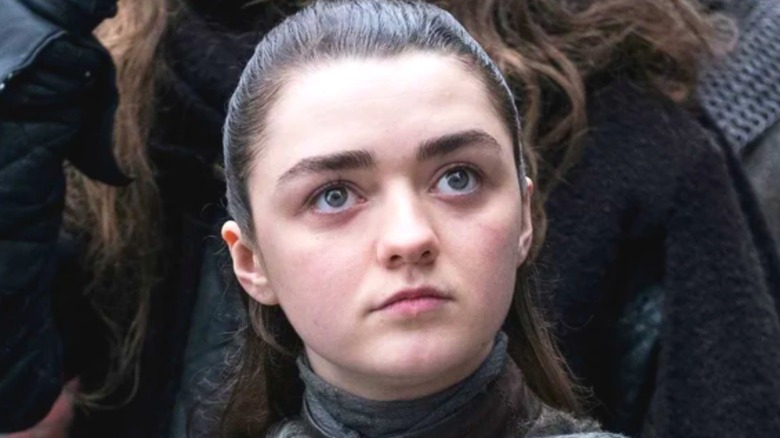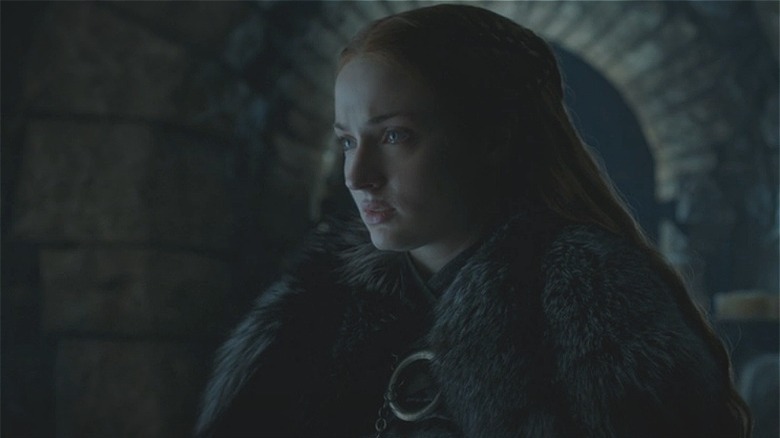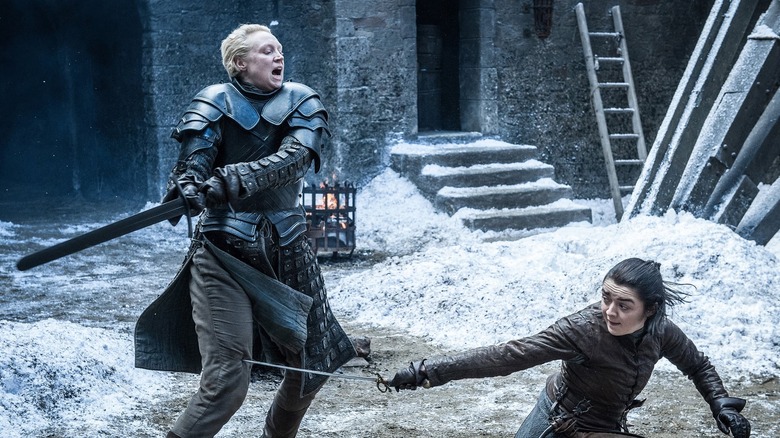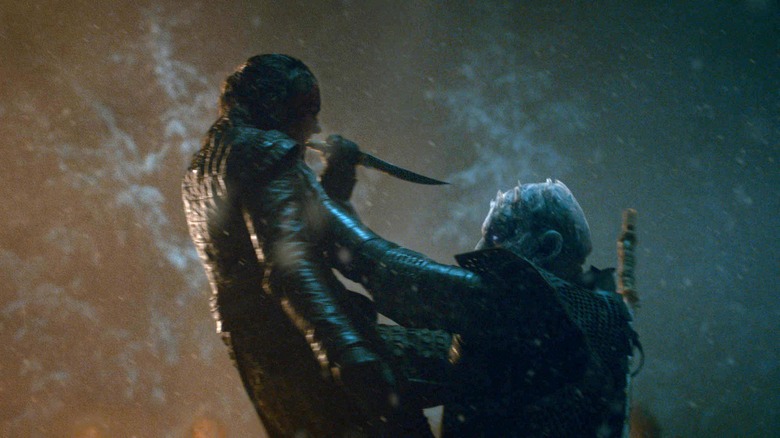The Arya Stark Scene In Game Of Thrones That Went Too Far
Arya Stark (Maisie Williams) is one of the most beloved "Game of Thrones" characters, and one of the few to survive all eight seasons. The youngest Stark daughter has seen more than her fair share of troubles, and audiences were witness to her cleverness and strength of will throughout each adversity. She was held captive twice, received tortuous training at the House of Black and White, and finally proved her mettle when she assassinated the remaining names on her kill list — not to mention defeating the Night King.
To many fans, it may seem that Arya can do no wrong — but it would be remiss to say that she didn't commit a few sins along the way. She had a tendency to let her emotions control her actions, as evident by her betrayal in the House of Black and White, or when she left the Hound (Rory McCann) to die in agony. Yet there is perhaps one moment that stands out above the rest of Arya's transgressions — one that showed a side of Arya that left fans with a bitter taste in their mouths.
Arya's threat to Sansa was out of character
In Season 7, Episode 5 of "Game of Thrones" — "Eastwatch" — Arya becomes suspicious of her sister, Sansa (Sophie Turner), who appears to be enjoying her authority a bit too much while Jon Snow (Kit Harrington) is away from Winterfell. Of course, Sansa denies Arya's allegations that she means to betray their brother, but when Arya finds the old letter that Sansa wrote while being held hostage by the Lannisters (placed strategically by Little Finger), it seems to cement the younger Stark sister's doubts.
Meanwhile, In Episode 6, "Beyond the Wall," Sansa sneaks into Arya's room, where she is shocked to find Arya's collection of faces. Arya catches her in the act, and gives her a bone-chilling, not-so-veiled threat. When Sansa questions Arya about the faces, Arya tells her, "With the faces, I can choose. I can become someone else — speak in their voice, live in their skin. I could even become you." Arya then takes a knife from a table and stalks closer to Sansa, as she wonders out loud what it might be like to wear Sansa's face. Arya then calmly hands Sansa the knife and walks out of the room, leaving Sansa trembling in fear.
While it's true that the sisters may not have gotten along well in the past, the idea of Arya threatening Sansa's life is just unsettling, not to mention out of character. After all, there are so few members of the Stark family left, and it would be detrimental to their cause if they were to start turning on each other. Luckily, Sansa and Arya catch on to Lord Baelish's (Aiden Gillen) scheme to tear them apart, and conduct a scheme of their own. Still, Arya definitely had us worried for a minute.
Arya's epic journey from a tomboy to a stone cold killer
When you consider the journey Arya goes through during the entire story of "Game of Thrones," it's easy to understand how she could make a mistake every now and then... especially when it comes to trusting people. The tomboy of the highborn, Northern Stark family, Arya wants nothing more than to learn to fight and become powerful in her own right, though her father Ned (Sean Bean) still holds out hope that she'll grow up to marry a great lord and mother plenty of heirs. Though Arya and Sansa's sisterly squabbles take up most of Season 1 of "Thrones," the two are the only witnesses from the family when Ned is beheaded in King's Landing, and years of separation ultimately serves their relationship (Arya's temporary mistrust of Sansa aside).
Without her family, Arya goes through a lot, to put it mildly, constantly escaping captivity and near-death situations thanks to her quick instincts, with very few allies to speak of — which probably contributes to her trust issues. Eventually, she befriends the mysterious Jaquen H'ghar (Tom Wlaschiha), who brings her to Braavos to teach her the ways of the Faceless Men — and Arya can't quite follow the Faceless Men's seemingly endless sets of rules, and uses her newfound face-shifting to seek revenge on enemies. However, it's hard not to root for Arya even as she shirks the tenets of the Faceless Men; the people she decimates are typically purely evil, like Walder Frey (David Bradley) and Meryn Trant (Ian Beattie), making her vengeance feel pretty righteous in the end.
In the end, Arya becomes one of the show's biggest heroes
Gruesome murders and acts of vengeance aside, in the eighth and final season of "Thrones," Arya proves herself by taking all of the combat skills and stealth she learned alongside the Faceless Men and using them to literally save the world... by bringing down the Night King once and for all. In Episode 3 of Season 8, "The Long Night," the Night King and his formidable army of wights arrive at Winterfell, and Arya and the rest of the humans there are left to defend the castle — which also means defending anything south of the stronghold, including the rest of Westeros.
Though most viewers probably thought that Arya's alleged bastard brother Jon Snow (Kit Harington) would be the one to bring down the Night King, in the end, it's Arya who leaps from the darkness just as the Night King approaches her omniscient younger brother Bran Stark (Isaac Hempstead-Wright). Unseen by other high-ranking White Walkers, Arya, armed with the Valyrian steel dagger that was once used in an attempt on Bran's life, hurls herself towards the Night King, and thanks to her ambidextrous fight training, she takes down the show's Big Bad.
After the Battle of Winterfell, Arya nearly loses her life when Daenerys (Emilia Clarke) lays waste to King's Landing — but, as always, she survives. Finally, after Daenerys is killed and Bran is crowned, Arya sets off to explore whatever might be west of Westeros, becoming exactly what she hoped to be as a young girl: a powerful, wealthy woman in charge of her own destiny. Arya might make some unpopular moves every now and then, but in the end, she's still one of the most popular "Thrones" characters around, despite her occasional missteps.



